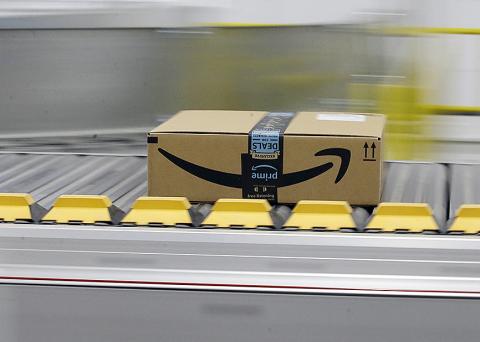Quebec is getting serious about taxing Amazon.com and Netflix Inc.
Canada’s second-most populous province on Tuesday said it would make the collection of the provincial sales tax mandatory for suppliers of goods and services based outside Quebec to put them on par with local rivals.
Quebec expects the measures will enable it to recover C$155 million (US$120 million) in lost revenue over five years, according to budget documents released in Quebec City.

Photo: AP
A failure to collect taxes on online sales of goods and services to companies outside the province costs Quebec about C$270 million annually, according to estimates by the provincial Ministry of Finance.
Most of the money, or C$158 million, pertains to goods such as shoes and clothes purchased abroad, Quebec Minister of Finance Carlos Leitao said on Tuesday.
An agreement between Los Gatos, California-based Netflix and the federal government over filming in Canada provoked widespread outrage in Quebec last year, in part because it did not subject the company to a sales tax.
That sparked the ire of Canadian media companies that must apply the tax, including on streaming units they set up to compete with Netflix.
“For services, Netflix and others, we are proposing legislative measures that will force these companies to register for our provincial sales tax regime,” Leitao said on Tuesday at a news conference in Quebec City. “They will need to collect the sales tax and to send it to us.”
For companies selling goods online, Quebec will follow the approach recommended by the Organisation for Economic Co-operation and Development, which is to collect taxes at the border, Leitao said.
Starting on Jan. 1 next year, foreign companies that sell more than C$30,000 a year in taxable supplies of goods or services to Quebec consumers would be required to register for the provincial sales tax, budget documents show.
Until now, suppliers without a physical or significant presence in the province were not required to register for the tax, or to collect or remit it.
Canadian companies that do not have a physical or significant presence in Quebec are to get eight more months to adjust: They are not going to be required to register for the provincial sales tax until Sept. 1 next year.
“Given the Canadian economy’s high level of integration, a potentially significant number of businesses of all sizes may be impacted,” the ministry’s document said.

Intel Corp chief executive officer Lip-Bu Tan (陳立武) is expected to meet with Taiwanese suppliers next month in conjunction with the opening of the Computex Taipei trade show, supply chain sources said on Monday. The visit, the first for Tan to Taiwan since assuming his new post last month, would be aimed at enhancing Intel’s ties with suppliers in Taiwan as he attempts to help turn around the struggling US chipmaker, the sources said. Tan is to hold a banquet to celebrate Intel’s 40-year presence in Taiwan before Computex opens on May 20 and invite dozens of Taiwanese suppliers to exchange views

Application-specific integrated circuit designer Faraday Technology Corp (智原) yesterday said that although revenue this quarter would decline 30 percent from last quarter, it retained its full-year forecast of revenue growth of 100 percent. The company attributed the quarterly drop to a slowdown in customers’ production of chips using Faraday’s advanced packaging technology. The company is still confident about its revenue growth this year, given its strong “design-win” — or the projects it won to help customers design their chips, Faraday president Steve Wang (王國雍) told an online earnings conference. “The design-win this year is better than we expected. We believe we will win

Chizuko Kimura has become the first female sushi chef in the world to win a Michelin star, fulfilling a promise she made to her dying husband to continue his legacy. The 54-year-old Japanese chef regained the Michelin star her late husband, Shunei Kimura, won three years ago for their Sushi Shunei restaurant in Paris. For Shunei Kimura, the star was a dream come true. However, the joy was short-lived. He died from cancer just three months later in June 2022. He was 65. The following year, the restaurant in the heart of Montmartre lost its star rating. Chizuko Kimura insisted that the new star is still down

While China’s leaders use their economic and political might to fight US President Donald Trump’s trade war “to the end,” its army of social media soldiers are embarking on a more humorous campaign online. Trump’s tariff blitz has seen Washington and Beijing impose eye-watering duties on imports from the other, fanning a standoff between the economic superpowers that has sparked global recession fears and sent markets into a tailspin. Trump says his policy is a response to years of being “ripped off” by other countries and aims to bring manufacturing to the US, forcing companies to employ US workers. However, China’s online warriors